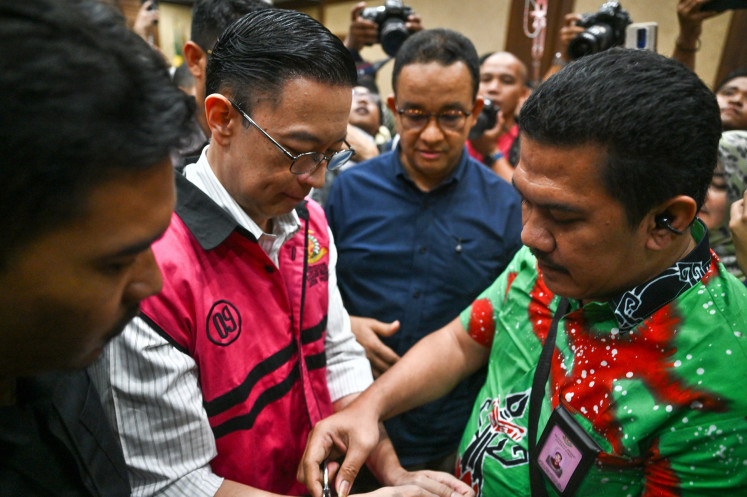Popular Reads
Top Results
Can't find what you're looking for?
View all search resultsPopular Reads
Top Results
Can't find what you're looking for?
View all search resultsBiotechnology crops: An assessment
An important milestone was reached last year, on Oct
Change text size
Gift Premium Articles
to Anyone
A
n important milestone was reached last year, on Oct. 31, 2011. On that day, the United Nations confirmed that the world’s population had reached 7 billion.
Among other implications, there was one stark conclusion; a world already running short of many natural resources would have to find ways to feed 7 billion people, with this number likely to grow to 10 billion by the end of this century.
Can we feed the world of tomorrow? Conventional food production technology alone is struggling to produce food in sufficient quantities, while data from the World Bank shows that large segments of the populations in developing countries are below the poverty line and lack the resources to feed themselves properly. In Indonesia, it is estimated that 13.3 percent of the population — more than 30 million people — survive below the poverty line, with millions more going hungry on a frequent basis.
These two factors — limited food production and poverty — require additional ways of feeding populations. This is where biotechnology has a potentially significant role
to play.
Biotechnology offers additional ways of increasing world food, feed and fiber supply. Since being first commercialized in 1996, biotech crops have shown that they offer two important advantages for developing nations, an increase in agriculture output per hectare, and a decrease in food production costs.
International Service for the Acquisition of Agri-biotech Applications (ISAAA) studies confirm that during the period 1996 to 2010, the value of increased food production resulting from biotech crops was US$78 billion.
Approximately 60 percent of this value is due to increased tonnage, with the remaining 40 percent due to decreases in production costs. Put another way, increased food production from biotech crops is equivalent to an extra 276 million tons of output for this 15-year period. Using conventional agriculture technology alone would require an additional 91 million hectares of land to produce this same amount.
Political will is absolutely essential for the success of biotech crops as well as their timely deregulation. The experience of other countries, Brazil in particular, is very relevant to Indonesia.
Brazil has successfully expedited the responsible and timely deregulation of new biotech crop products, which has contributed to the domestic food/feed needs of fast-growing population as well as significant exports, particularly soybeans.
Since embracing biotechnology, Brazil is now ranked number two
in the world in biotech crop hectarage, with 30.3 million hectares of land planted with biotech soy, maize and cotton.
Studies by PG Economics data show that the Brazilian economy gained $4.6 billion in increased
crop production revenues during the period 2003 to 2010, with $1.2 billion of this revenue being earned in
2010 alone.
As well as increased production, other benefits for Brazil include decreased investments and applications of pesticides and other crop protection measures.
Equally, if not more, significantly, Brazil’s crop/food production capacity now means that it is now a major exporter of key crop/food products — for example; Brazil now exports soybeans, earning the country approximately $17 billion in income annually.
This commitment to biotechnology on the part of Brazil shows little sign of slowing. The country’s government approved eight products in 2010 and a further six last year.
This is in stark contrast to other parts of the world, such as the European Union, which approved only two biotech crops in the last 15 years — MON 810, a Bt maize, and a biotech potato named Amflora — grown in Germany and Sweden in 2011.
So why is there this dramatic disparity between the adoptions of biotechnology in different parts of the world? First, there is a mistaken belief that biotech crops erode biodiversity while the opposite is true.
This misconception has been a major sticking point for a country like Indonesia where its rich biodiversity is both a major national asset and a key element of the country’s heritage.
However, the fact is that biotechnology is actually a land saving technology. If we review studies conducted during the last 15 years, they clearly demonstrate that biotech crops have increased yield per hectare and reduced the slash-and-burn agriculture in tropical forests including the Amazon.
Indonesia’s rainforest is an important element in the world’s biodiversity and, by optimizing productivity form existing arable land, biotech crops can in fact protect biodiversity by reducing the probability for slash and burn agriculture.
Biotech crops have also been criticized, for being unsafe as food while a science based assessment clearly shows this is not the case. It should be noted that it was scientists, not critics of biotech crops, who insisted that rigorous evaluation systems for the new biotech crops 16 years ago.
Reality is that biotechnology-based food products have been tested for 16 years, and found to be as safe, or in some cases safer than conventional crops.
However, it needs to be emphasized that appropriate regulation that deliver deregulated products in a timely manner needs to continue to ensure the ultimate protection of the end user. Current biotech crops are focused on insect resistance and herbicide tolerance. The overarching objective of testing biotech crops is to safeguard both consumers and producers.
Critics of biotech crops have also mistakenly claimed that farmers have been exploited by the developers of biotech crops as a result of farmers planting the crops against their better judgment.
Millions of farmers worldwide have made more than 100 million conscious decisions to plant and replant biotech crops because of one reason alone, because biotech crops deliver significant and substantial benefits in 29 countries around the world.
Another important to note, and one frequently overlooked during heated debates on the issue, is that biotechnology is not advocated as a substitute for good and traditional agricultural practices, such as rotations and effective management of pests and weeds.
Farmers, biotech companies, national governments and other stakeholders need to collaborate to ensure that biotech crops can complement conventional technology which also requires the implementation of good farming practices.
Biotech crops can be best characterized as a new, essential and powerful tool in the toolbox to control pest weeds and diseases as well as other constraints that must be overcome in order to contribute to the important goal of global food security.
Finally, the critical question to be considered is whether Indonesia can afford to ignore the enormous potential of biotechnology. For example, biotechnology can offer a solution for Indonesia’s dependency on imported maize. Indonesia imports 1.5 million tons of maize each year and biotechnology gives an opportunity to substitute the imported maize with a domestic product that allows Indonesia to be less dependent on other countries for sustenance.
In terms of the next steps, Indonesia needs to learn from the experiences of other countries, in terms of how the market for biotechnology-related products has been deregulated, and how best practices have been created and adopted.
It also needs to consider how to promote a greater understanding of biotechnology among consumers and the farming sector in Indonesia, and to show farmers how products and practices can be tested, before decision are made and legislation passed.
The writer is founder and chair of the International Service for the Acquisition of Agri-biotech Applications.










